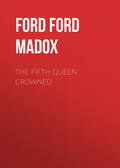
Форд Мэдокс Форд
The Queen Who Flew
"I don't know about your stockings, lady," the man said; "but if you've got any old clothes to spare, I could give you some nice pots of flowers for them."
The Queen said, "Why, what good would that do you?"
And the man answered, "I should sell them and get some money. I'm fearfully hungry."
"Why don't you have something to eat, then?" the Queen said.
And the man replied, "Because I haven't got any money to buy it with."
"Why don't you take it, then?"
"Because it would be stealing, and stealing's wicked; besides, I should be sent to prison for it."
"I don't understand quite what you mean," the Queen said. "But come with me somewhere where we can get some food, and you shall have as much as you like."
The fern-seller arose with alacrity.
"There's a shop near here where they sell some delicious honey-cakes."
"I can't make it out," the Queen said to herself. "If he's hungry he can't be contented; and yet the Regent said every one was contented in the land, because of his being Regent. He must have been mistaken, or else this man must be one of the traitors."
And aloud she said, "Is there a bill of attainder out against you?"
The beggar shook his head. "I guess not," he said. "Tradesmen won't let the likes of me run up bills."
It was a remark the Queen could not understand at all. They crossed the market-place that lay before the palace door.
"There's no market to-day because the people are all afraid the revolution isn't over yet."
"Oh, but it is," the Queen said; "I made the Lord Blackjowl Regent to-day."
The beggar looked at her with a strange expression; but the Queen continued —
"I don't see what harm the revolution could do to the market."
"Why, don't you see," the beggar said, "when they get to fighting the arrows fly about all over the place, and the horses would knock the stalls over. Besides, the soldiers steal everything, or set fire to it. Look, there's a house still smouldering."
And, indeed, one of the market houses was a heap of charred ruins.
"But what was the good of it?" the Queen asked.
And the beggar answered, "Well, you see, it belonged to one of the opposite party, and he wouldn't surrender and have his head chopped off."
"I should think not," the Queen said.
The streets were quite empty, and all the shutters were closed. Here and there an arrow was sticking into the walls or the doors.
"Do people never walk about the streets?" the Queen asked.
"It wouldn't be safe when there's a revolution on," the beggar answered.
Just at that moment they arrived before the door of a house that, like all the rest, was closely shut up. Over the door was written —
"JAMES GRUBB,
Honey-cake Maker."
Here the beggar stopped and began to beat violently at the door with his staff.
The sound of the blows echoed along the streets, – and then from within came dismal shouts of "Murder!" "Police!" "Fire!"
But the beggar called back, "Nonsense, James Grubb; it's only a lady come for some honey-cakes."
Then, after a long while, there was a clatter of chains behind the door, and it was opened just an inch, so that the Queen could see an old man's face peeping cautiously out at her. The sight seemed to reassure him, for he opened the door and bobbed nervously. At other times he would have bowed suavely.
"Will your ladyship be pleased to enter?" he said. "I want to shut the door; it is so dangerous to have it open with all these revolutions about."
The Queen complied with his request, and found herself in a little dark shop, only lighted dimly through the round air-holes in the shutters.
"Give this man some honey-cakes," she said; and the honey-cake maker seemed only too delighted.
"How many shall I give him, madam?" he said.
"As many as he wants, of course," the Queen answered sharply.
The beggar proceeded to help himself, and made a clean sweep of all the cakes that were on the counter. There was a big hole in his coat, and into that he thrust them, so that the lining at last was quite full.
The honey-cake maker was extremely pleased at the sight, for he had not expected to sell any cakes that day.
When the cakes had all disappeared there was an awkward pause.
"Now I'll go on again," the Queen said.
"But you haven't paid," the honey-cake maker said in some alarm.
"Pay!" said the Queen. "What do you mean?"
"Paid for the cakes, I mean," the honey-cake maker said.
"I don't understand you," she answered. "I am the Queen; I never pay for what I eat."
"She is the Queen," the beggar said; "and if you don't take care she'll have your head off."
The honey-cake maker jumped back so suddenly that he sat down in a tub of honey and stuck there doubled up with his knees to his chin.
"O Lord! O Lord!" he said. "What shall I do? what shall I do? – all my cakes gone, and never to be paid!"
"You won't want to be paid if your head's cut off," the beggar said.
But the Queen answered, "Nonsense. No one's going to cut your head off; and I dare say, if you ask them at the palace, they'll pay you, whatever it means. Just pull him out of the tub," she continued to the beggar, for the unfortunate honey-baker, not being able to move, remained gasping in the tub.
So the beggar pulled him out, and, for all his fright, his business spirit did not desert him.
"Will your Majesty deign to sign an order for payment?" he said.
And the Queen answered, "Good gracious, no, I won't; the ink always gets into my finger-nails."
The honey-cake maker bowed lower still. "At least, your Majesty, deign to give me your signet-ring as a token."
"Oh, I'll give you that," the Queen said; and she drew it from her finger.
The honey-cake maker suddenly smote his forehead with his hand, as though an idea had struck him.
"You might carry that ladder out for me," he said to the beggar, indicating a ladder that lay along the passage wall.
The beggar did as he was asked, and placed it against the house.
"Whatever is he going to do now?" the Queen thought to herself, and, being in the street, awaited the turn of events.
Presently the honey-cake maker came out, carrying a pail of black paint and a large brush, and, thus equipped, ascended the ladder and began to paint, under the
"JAMES GRUBB,
Honey-cake Maker,"
"to Her Majesty the Queen and the R —"
But he had got no further than that, when, with tumultuous shouts, a body of soldiers came rushing round a corner, and, seeing the honey-cake maker on the ladder and his door open, they at once tumbled pell-mell into the shop.
No sooner did the unfortunate maker of cakes see this, than, in his haste to descend the ladder, his foot slipped, and he came to the ground, with the paint out of the pot running dismally all over his head.
"Oh dear! oh dear!" the Queen said, and went to pick him up, when, at that moment, the soldiers having found nothing in the shop but a tub of honey and a tub of flour, came out again, not quite as fast as they had entered, until they saw the Queen, when they at once rushed to surround her, and one of them caught at her crown, and another at her bracelets, and another at her lace-handkerchief!
The Queen said, "Leave me alone, do you hear?"
But the soldiers answered, "In the Queen's name, surrender."
"Well, I shouldn't surrender in any name but my own, and I shan't surrender at all. I am the Queen."
Whereupon the leader of the soldiers, who had not had the fortune to get at any of the Queen's jewellery, said, "Release the lady;" and, rather crestfallen, the soldiers obeyed him.
"Oh, your Majesty," the leader said, kneeling, "we have had such a trouble to find you. The Regent, discovering that your Majesty had left the palace, told us to follow you with all haste to provide for your safety."
"So you provided for it by trying to rob people's houses," the Queen said.
And the leader answered, "Oh no, your Majesty. We feared, knowing that James Grubb is a noted rebel, that he had kidnapped your Majesty, and so were making a domiciliary search."
"I'm not a noted rebel," the honey-cake maker gasped. "I'm only noted for my honey-cakes."
But no one noticed his little puff.
The Queen said to the soldiers, "Well, I don't want you. You can go; and don't make any more domiciliary searches."
The leader, however, answered, "Oh, but, your Majesty, domiciliary searches are most necessary in the present state of the kingdom."
"I don't care," the Queen said; "I forbid you to make them. So now go away."
"But, your Majesty," the leader answered, "the Regent gave us orders to conduct your Majesty back to the palace. It is not constitutional."
"I'm sure I don't care," the Queen answered; "I'm not going back. Good-bye."
And she suddenly flew straight up into the air and away over the housetops, and the last sight she had of them showed them, with their faces upturned towards her, gazing in dumb astonishment, the leader still on his knees and the honey-cake maker on his back in the street.
The beggar had long since slunk round a corner and disappeared.
So the Queen rose to quite a great height in the air.
"I shall go right away from the town," she said "The smoke is so choking up here above the roofs. However people can live down there I can't make out."
So she went right up into the blue sky and made her way towards where, at the skirts of the town, the mountains rose steep and frowning.
Up there, standing on the mountain's crest, she had a glorious view of sea and sky and town and country.
The sea threw back the deep blue of the sky above, and the white wave-horses flecked its surface, and the ships passed silently far out at sea; down below her feet, it beat against the rocky base of the cliff, and in and out amongst the spray the seagulls flew like a white cloud.
The town lay in a narrow valley, broad at the sea face, and running inwards into narrowness between grey, grand hills, right to where it disappeared in the windings of the pass. Down below, in the harbour, she could see the boats getting ready for sea.
"Oh, how wonderful!" the Queen said; "and it all belongs to me – at least, so they say – though I can't quite see what good it does me, for I can't be everywhere at once. And I can't even make the hills move or the sea heave its breast; so that I can't see that it does me any more good than any one else, because it isn't even constitutional for me to be here. I ought to be down there in the palace garden, seeing nothing at all. However, it's very lovely here, so I mustn't grumble. I wonder how the bat is getting on, and the Regent, and all."
So for a while she stayed, looking down at the town. Into the streets she could not see, for the houses stood in the way, but she could see the market-place plainly enough and the palace steps.
Presently a number of soldiers came running into the market-place, and up into the palace, and the Queen knew they had come to announce her flight.
And then, a few minutes after, she saw then coming rapidly out of the doors.
"Goodness me!" the Queen said, "the Regent is kicking them down the steps. I shan't go back there again, or he might take to kicking me."
So she set out along the hilltops, sometimes walking and sometimes flying over the valleys, so that, by the time the sun was near setting, she found herself in a great stretch of dreary uplands, with nothing like a house for miles around.
"Now, whatever shall I do?" she said. "It's coming on quite dark, and I don't know where I am. I've a good mind to lie down and go to sleep on the heather; only there might be some sort of wild animals about, and it wouldn't be safe."
Then the sun sank lower and lower, and the Queen began to feel a little lonely and very nervous. There was not a sound to be heard, save the roar of a brook that ran, gleaming white, among the boulders in the gloom of the valley at her feet.
"If I fly right up in the air again I shall be safe, at any rate," the Queen said. "I shan't go tumbling over precipices or getting eaten up by wolves."
So she flew right up into the upper air where she could see the sun again, and she tried to catch him up, flying fast, fast westwards. But she found that the sun went a great deal faster than she could go – for, you know, the sun goes a great deal more quickly than a train – and gradually he sank below the horizon, and the Queen was left alone with nothing but the stars to keep her company.
As you may imagine, it was not the pleasantest of feelings, that flying through the pitch-dark night, and the Queen felt continually afraid of running against something, though she was really far too high to do any such thing.
But, for all that, she had the dread constantly in her mind, until at last the moon crept silently into being above a hill, seeming like an old friend, and soon all the land below was bathed in white light. The Queen glided on; like a black cloud, she could see her shadow running along the fields below her. She watched till she grew sleepier and sleepier, and found herself nodding, to wake with a start and then fall off to sleep again; till, at last, she fell asleep for good and all, and went sailing quietly along in the white night, whilst the moon gradually mounted up straight overhead, and then sank lower and lower, and the dawn began to wash the world below her with a warmer light.
But the Queen slept softly on; and, indeed, never bed was softer than the air of the summer night.
The sun had been up some little while when she was awakened by just touching on the top of a lofty mountain, that reached up into the sky and stopped her progress; so that, when she was fully awakened, she found herself seated on its peak.
She rubbed her eyes, and in a moment remembered all that had happened before she had dropped off to sleep.
"Goodness me! I feel awfully hungry," she said to herself, and, standing up, looked around her.
On the one side, the mountain towered above the uplands over which she had passed in the night, but they looked dreary and uninviting; on the other, in a fair plain, stood a town – she could see the smoke rising from the chimneys and the weather-cocks gleaming in the morning sunlight as they veered about in the breeze. So she flew gently down towards it, and the shepherds in the fields and the women at the cottage doors stared in amazement, and came rushing after her as she swept past through the air.
So, by the time she arrived in the town, quite a great crowd had followed her.
At last she alighted just before the town gates, and, as there was no guard to stop her, entered boldly enough, and walked on for a little way until she came to a shop that seemed to be a cake-shop, for one half of its window was full of cakes, and the other of boots and shoes. And, indeed, the owner, an old man with spectacles on, was seated on his doorstep busily working away at his cobbler's bench.
The Queen said, "I want some cakes, please."
And the cobbler, looking up from his work, said, "Then you've come to the right shop."
The crowd stood round in a ring and whispered.
"Will you give me them, please?" the Queen continued.
And the old cobbler answered, "I'll sell them to you."
"But I haven't got any money," the Queen said.
"Then you've come to the wrong shop," the cobbler said determinedly, and looked down again at his work.
"But I'm the Queen," she said, remembering her former experience.
The cobbler said, "Nonsense!" and took a little brass nail from his mouth.
"But I am the Queen," the Queen said angrily.
The cobbler knocked the nail into the shoe. "King Mark's a widower," was all he said.
And the crowd laughed until the Queen felt quite uncomfortable. She was not used to being stared at.
"Why, I must have got into another country," she said to herself; "and, I suppose, the best thing to do will be to see the King. I dare say he'll give me enough to eat, for he'll tremble at my name."
So she said aloud, "Take me to the King."
And so the crowd showed her the way, some going in front and some following; but all so anxious to see her that they stumbled over each other's legs.
But at last they came to the palace, and the crowd opened to make way for her. To tell the truth, they seemed rather afraid to enter, but the Queen marched in boldly enough till she came to a great hall. Long before she had time to make out what it was like, an enormous voice shouted —
"Who the dickens are you?"
And, looking at the throne, she could make out an enormous, black-bearded man seated thereon. He was a great deal more ugly than the Regent at home had been, and his red eyes twinkled underneath black, shaggy brows, like rubies in a cavern.
"Who are you?" he shouted.
And whilst his fearful voice echoed down the great dark hall, the Queen answered —
"If you won't tremble, I'll tell you."
The King gave a tremendous roar of laughter. "Ho, what a joke!" he said, and, to enforce it, he punched in the ribs the chamberlain who stood at his right hand, and that so violently that the wretched man rolled down the throne steps, taking care to laugh vigorously the whole time, until the King roared, "Be quiet, you idiot!" when the chamberlain at once grew silent. Then the King said, somewhat more softly, "I'll try very hard not to tremble; but if I'm very frightened you won't mind, I hope."
And all the courtiers laughed so loud and long at the King's sarcasm, that the Queen had some difficulty in making herself heard.
Then she said, "I am Eldrida, by the grace of God Queen of the Narrowlands and all the Isles."
The King really did seem a little startled.
"What in the world do you want here, then?" he said, and his red eyes glowed again.
"I want something to eat," the Queen said.
The King seemed lost in thought. "Your Majesty shall have something if – "
"If what?" the Queen asked.
"If you will marry me," the King said in a tone that was meant to be sweet; but it rather reminded the Queen of a bull she had once heard grumbling angrily.
She answered decidedly, "I shan't do anything of the sort."
The King said, "Why not?"
"Because you're a great deal too cruel and ugly," the Queen answered. "What did you knock that poor man down for? I can't bear that sort of wickedness. And as for ugliness, why, you're worse than the Regent himself, and he's the ugliest man I ever saw."
The King immediately became so convulsed with rage that he could only roar till the windows shook out of their frames and shattered on the ground; and the Queen stopped her ears with her fingers, perfectly aghast at the storm she had raised.
At last the King regained his powers of speech. "If you don't marry me this very day," he said, "I'll have you beheaded, I'll have you hanged, I'll have you thrown from the top of the highest tower in the town and smash you to pieces."
"You couldn't do anything of the sort," the Queen said calmly.
Thereupon the King's rage became quite frightful to see, especially for the courtiers who were nearest him, for he rushed among them and began to kick them so that they flew into the air; indeed, it seemed as if the air was full of them. But, in the middle of it, he suddenly made a dash at the Queen, and, before she could avoid him, had seized her in his fearful grasp.
"I'll show you if I can't dash you to pieces," he said, and in a minute he had seized her and rushed out into the open air, carrying her like a kitten.
Up to the little door at the foot of the palace tower he went and kicked it open so violently that it banged against the wall and quivered again with the shock, and then round and round and round, and up and up and up, a little dark winding stair, until a sudden burst of light showed that they were at the top.
"Now I'll show you," he muttered, and, shaking her violently he threw her over the side.
But she only dropped softly a short way, and then hovered up again till she played in the air around the tower.
The astonishment of the King was now even greater than his former rage.
"I told you how it would be," the Queen said. "And, if you'll take my advice, you won't lose your temper so fearfully again. It might really make you ill."
But the King said nothing at all, being a little out of breath at having come so quickly up the tower steps. So the Queen flew gaily off again without saying "Good-bye."







